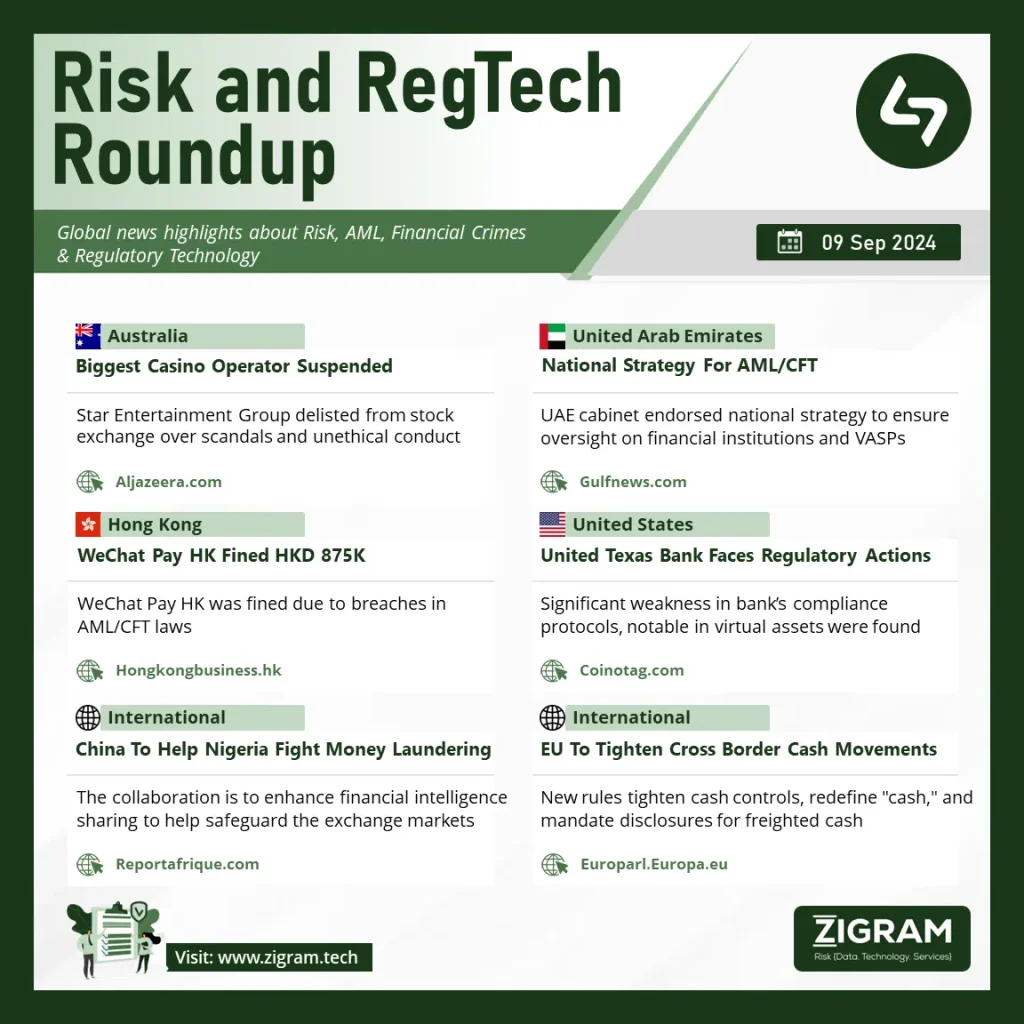Newsletter (2 Sep – 8 Sep 2024)
Welcome to this week’s edition of the Global AML News Weekly Digest. Here are the top stories making headlines around the world:
1. Australia’s Largest Casino Operator Suspended From Stock Exchange
In a significant regulatory move, Star Entertainment Group, Australia’s biggest listed casino operator, has been temporarily suspended from the Australian Securities Exchange (ASX). The suspension follows the company’s failure to file its annual financial results, which comes amidst a series of scandals involving criminal activities and unethical conduct at its casinos. As authorities increase scrutiny of the company, this delisting marks a critical turning point for the troubled operator. Star Entertainment is under pressure to restore its compliance and rebuild its reputation in the gambling industry.
Read More
2. UAE Adopts Comprehensive National Strategy For Anti-Money Laundering
In a proactive step towards strengthening financial integrity, the UAE has endorsed a new National Strategy for Anti-Money Laundering (AML) and Countering the Financing of Terrorism (CFT). Announced by His Highness Sheikh Mohammed bin Rashid Al Maktoum, the strategy ensures rigorous oversight of financial institutions and virtual asset service providers, promoting transparency and governance. This initiative is expected to reinforce the UAE’s standing as a secure and compliant financial hub while addressing global concerns about financial crimes in the region.
Read More
3. WeChat Pay HK Faces Penalty For AML Violations
The Hong Kong Monetary Authority (HKMA) has levied a HKD 875,000 fine on WeChat Pay HK (WPHK) for failing to comply with anti-money laundering and counter-financing of terrorism regulations. Over five years (2016-2021), WPHK’s systems was unable to meet the necessary controls stipulated in guidelines for Stored Value Facility (SVF) licensees. This action highlights Hong Kong’s commitment to maintaining stringent regulatory oversight on digital payment providers, ensuring compliance with global financial crime prevention standards.
Read More
4. United Texas Bank Hit With Regulatory Action Over Cryptocurrency Oversight
Regulators have issued a formal cease and desist order against United Texas Bank following a critical review of its risk management and anti-money laundering processes. The Federal Reserve and the Texas Department of Banking found serious compliance failures, particularly in the bank’s dealings with virtual currency customers. The deficiencies, mainly linked to Bank Secrecy Act (BSA) violations, underline traditional banks’ ongoing regulatory challenges when navigating the cryptocurrency sector. Immediate corrective measures are required to address the gaps in the bank’s AML and BSA compliance protocols.
Read More
5. China And Nigeria Strengthen Ties To Combat Money Laundering
China and Nigeria have entered into a strategic agreement aimed at intensifying efforts to fight money laundering and terrorism financing. The agreement was reached following a high-level meeting between Nigerian President Bola Ahmed Tinubu and Chinese President Xi Jinping. As part of this cooperation, the two nations will enhance financial intelligence sharing, aiming to protect Nigeria’s financial system and bolster its foreign exchange markets. This partnership underscores the global nature of financial crime and the need for international collaboration.
Read More
6. EU Tightens Cross-Border Cash Movement Regulations
In a bid to close loopholes in existing legislation, the European Union is stepping up its controls on cross-border cash movements. New regulations, backed by the Civil Liberties and Economic Affairs committees, mandate tougher checks on cash entering or leaving the EU, with individuals required to declare sums over €10,000. This move strengthens the 2005 First Cash Control Regulation, aiming to close gaps exploited by criminals, such as inconsistent penalties and undeclared cash transfers just below the legal threshold. The new rules are a significant step towards enhancing the EU’s ability to combat terrorist financing and other financial crimes.
Read More
Stay informed with our weekly digest, bringing you the most impactful news from around the globe. Thank you for reading!
Subscribe to our weekly Newsletter – Click Here
Empower your organization with ZIGRAM’s integrated RegTech solutions – Book a Demo
- #FinancialCrime
- #AML
- #CFT
- #MoneyLaundering
- #CasinoScandals
- #CryptocurrencyRegulation
- #RegulatoryCompliance
- #WeChatPay
- #CrossBorderRegulations
- #GlobalPartnership
- #FinancialOversight
- #UAEFinance
- #EURegulations
- #VirtualAssets
- #AntiTerrorFinancing
- #FinancialIntelligence
- #StockExchange
